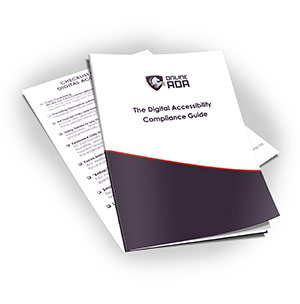The United States just made a major advancement in digital inclusion: the Department of Justice (DOJ) has issued a final rule to update the Americans with Disabilities Act (ADA), ensuring that government websites and mobile applications are accessible to individuals with disabilities.
The final rule, which falls under Title II of the ADA, was published to the Federal Register today, April 24th 2024.
This decisive move marks a milestone in the evolution of ADA compliance, not to mention digital accessibility-specific regulation in the United States in general. It also reinforces the U.S. government’s previous statements about the necessity for equal access to digital content and their commitment to making it actually happen.
Improving Access to Digital Government Resources
The final rule, detailed on the Department of Justice’s official website, applies to all state and local governments and mandates that all entities under this category – including public education entities, as an example – must ensure their websites and mobile applications are accessible to people with disabilities.
Additionally, the rule clarifies that all existing, new, and modified web content must be accessible per the Web Content Accessibility Guidelines (WCAG). These internationally recognized guidelines serve as the benchmark for digital accessibility, ensuring that individuals with a range of disabilities—including visual, hearing, and physical disabilities, among many more—can effectively navigate and interact with digital interfaces.
For government entities, the transition may involve revamping web design and digital interfaces to include features like screen reader compatibility, proper keyboard navigation, text-to-speech functionality, and navigational aids that are conformant with the WCAG.
What's Next?
This update to the ADA reflects the DOJ’s commitment to adapting its policies to meet today’s technological advancements and their acknowledgement of the growing importance of digital spaces in everyday life.
Although this final rule focuses on government entities, it should not keep other businesses and organizations (ones that do not fall under Title II of the ADA) from addressing their own digital accessibility. This final rule is set up to be the first of many steps toward more concrete digital accessibility regulations. In the coming years, we may very well see business-oriented digital accessibility regulations.
As we advance, it is imperative for all stakeholders to embrace these changes and integrate accessibility into the core of their digital strategy, ensuring that everyone, regardless of disability, has equal access to the digital resources they need to thrive in today’s world.
Learn More About the DOJ's Final Rule
Below are a few links to more information about the DOJ’s new final rule:
- Official press release from the Office of Public Affairs
- Fact sheet on how the final rule will affect state and local governments
- The DOJ’s final rule that was published in the Federal Register this morning
How Accessible is Your Digital Content?
The Justice Department’s final rule is a major step toward creating a more accessible digital world. However, our goal of true universal digital accessibility requires ongoing work, dedication, and improvement – especially as technology advances, digital accessibility standards get updated, and legal requirements change.
Ability is here to help ensure that your digital spaces – whether that’s a website, application, video, document, or other digital content – are accessible to all users. Our team of accessibility experts will assess, advise, and assist in implementing the necessary changes to ensure your website meets the highest standards of accessibility.
Every website made accessible, every app designed with inclusivity in mind, adds to the momentum. Join our team at Ability in this exciting journey. Together, we can ensure that the digital world is not just accessible but welcoming to all.
If you’re interested in getting a WCAG audit or even certifying your WCAG conformance, schedule a quick call with one of our accessibility experts.


